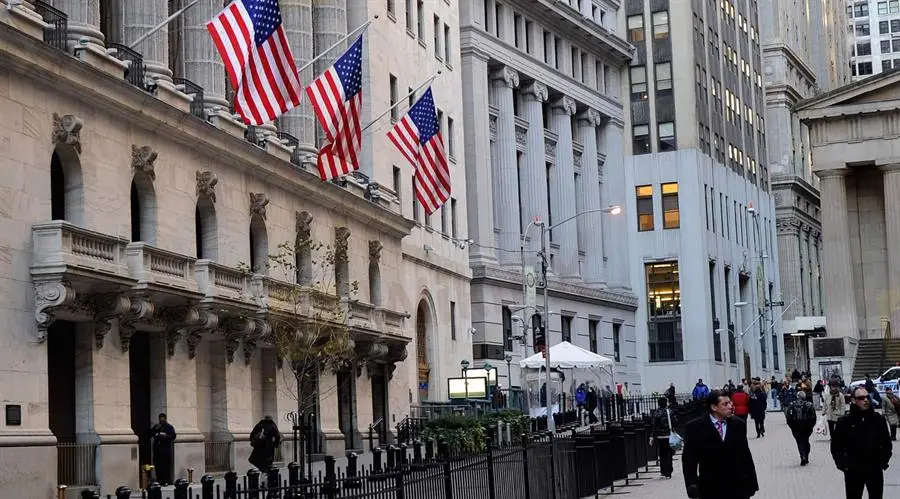简体中文
繁體中文
English
Pусский
日本語
ภาษาไทย
Tiếng Việt
Bahasa Indonesia
Español
हिन्दी
Filippiiniläinen
Français
Deutsch
Português
Türkçe
한국어
العربية
New York Fed Partners with US Banks on 3-Month Digital Dollar Project
Abstract:Some of the banks include BNY Mellon, Citi, HSBC and Wells Fargo. The Spanish banking community earlier this week launch a digital euro pilot project.

The Federal Reserve Bank of New Yorks Innovation Centre (NYIC) in partnership with some US banking giants has kickoff a three-month digital dollar proof-of-concept (PoC) project.
Take Advantage of the Biggest Financial Event in London. This year we have expanded to new verticals in Online Trading, Fintech, Digital Assets, Blockchain, and Payments.This project “will explore the feasibility of an interoperable digital money platform known as the Regulated Liability Network (RLN),” the US banking community noted. The goal of the project, the reserve bank further explained on Tuesday, is to “explore the feasibility of an interoperable network of central bank wholesale digital money and commercial bank digital money operating on a shared multi-entity distributed ledger.”

Participating Banks
Some of the major banks and financial institutions participating in the projects are BNY Mellon, Citi, HSBC, Wells Fargo, PNC Bank, TD Bank, Truist, U.S. Bank and Mastercard, among others. International messaging service provider, SWIFT, is also a part of the project. These organizations are to issue simulated digital money or tokens and settle transactions on them through simulated central bank reserves on the ledger.
“The PoC will also test the feasibility of a programmable digital money design that is potentially extensible to other digital assets, as well as the viability of the proposed system within existing laws and regulations,” the banks explained in a join-statement. NYIC added that the project will be conducted in a test environment and will adopt only simulated data.
The Center further clarified that the project is not targeted at advancing any specific policy outcome. The project also does not mean that the Federal Reserve “will make any imminent decisions about the appropriateness of issuing a retail or wholesale CBDC, nor how one would necessarily be designed.”
Digital Euro Pilot
The launch of the new digital dollar project comes days after up to 30 Spanish banks partnered to carry out new PoC trials to measure the impact of issuing a digital euro by the European Central Bank (ECB). The Spanish banking community project comes almost two months after the ECB selected five companies including Amazon to participate in a digital euro payment prototyping exercise.
The prototyping exercise, which will focus on different specific payment usage of the digital euro, is part of the ECB's two-year digital euro investigation project. The exercise is expected to be completed during the first quarter of 2023.

Disclaimer:
The views in this article only represent the author's personal views, and do not constitute investment advice on this platform. This platform does not guarantee the accuracy, completeness and timeliness of the information in the article, and will not be liable for any loss caused by the use of or reliance on the information in the article.
Read more

The Hidden Checklist: Five Unconventional Steps to Vet Your Broker
Forex broker scams continue to evolve, employing new tactics to appear credible and mislead unsuspecting traders. Identifying these fraudulent schemes requires vigilance and strategies beyond the usual advice. Here are five effective methods to help traders assess the legitimacy of a forex broker and avoid potential pitfalls.

Doo Financial Obtains Licenses in BVI and Cayman Islands
Doo Financial, a subsidiary of Singapore-based Doo Group, has expanded its regulatory footprint by securing new offshore licenses from the British Virgin Islands Financial Services Commission (BVI FSC) and the Cayman Islands Monetary Authority (CIMA).

CFI’s New Initiative Aims to Promote Transparency in Trading
A new programme has been launched by CFI to address the growing need for transparency and awareness in online trading. Named “Trading Transparency+: Empowering Awareness and Clarity in Trading,” the initiative seeks to combat misinformation and equip individuals with resources to evaluate whether trading aligns with their financial goals and circumstances.

Malaysian-Thai Fraud Syndicate Dismantled, Millions in Losses Reported
The Royal Malaysia Police (PDRM) has received 26 reports concerning the Nicshare and CommonApps investment schemes, both linked to a major fraudulent syndicate led by a Malaysian citizen. The syndicate’s activities came to light following the arrest of its leader by Thai authorities on 16 December.
WikiFX Broker
Latest News
ASIC Sues Binance Australia Derivatives for Misclassifying Retail Clients
WikiFX Review: Is FxPro Reliable?
Malaysian-Thai Fraud Syndicate Dismantled, Millions in Losses Reported
Trading frauds topped the list of scams in India- Report Reveals
AIMS Broker Review
The Hidden Checklist: Five Unconventional Steps to Vet Your Broker
YAMARKETS' Jingle Bells Christmas Offer!
WikiFX Review: Something You Need to Know About Markets4you
Revolut Leads UK Neobanks in the Digital Banking Revolution
Fusion Markets: Safe Choice or Scam to Avoid?
Currency Calculator


